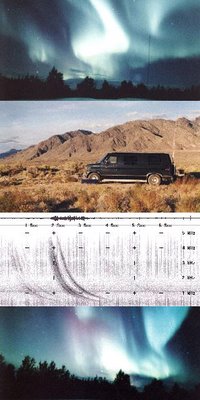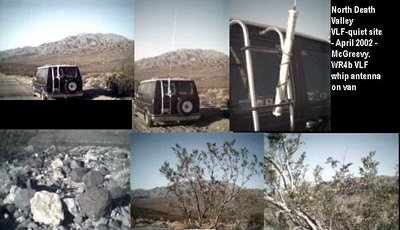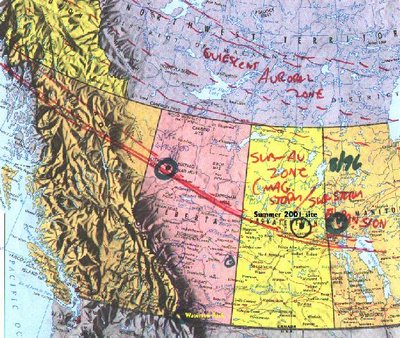Radio Haloes of Earth
The "music of the magnetosphere" has been extensively recorded and catalogued by Stephen P. McGreevy, who once drove his dimunitive black van all over North America, antenna close at hand.

McGreevy hopes to capture "the sounds of Earth's fascinating, naturally-occurring audio-frequency radio signals" – elsewhere referred to as the "radio sounds of 'space-weather.'"
Better yet, much of McGreevy's work can be downloaded for home listening.

Audible space weather appears, McGreevy explains, when energy from the sun "impacts Earth's Magnetosphere and generates lovely Aurora and Natural-Radio Signals." This topologically endless pressure-front between terrestrial energy and the radioactivity of the sun whistles, hisses and growls throughout McGreevy's MP3s.

The classicist inside me wonders: if Homer had made digital field recordings, wouldn't he, too, have sought these silent whisperings of the sun? Hymns from Apollo.
What new myths exist at the ends of untuned antennas? And what the hell is that sound?
This auroral chorus almost implies that birds imitate the sounds of space-weather every time they sing – but that claim clearly can't be substantiated while I'm typing into a laptop. (Can birds hear space weather? It's a legitimate question).

I actually find myself wondering at least two more things: 1) if humans had evolved just slightly differently, with different ears and skull structure, what catastrophic shiverings of distant galaxies might we hear? Eavesdropping on the sky, ablaze with endless whistling. Detonations of stars. Galaxial light.
2) Could you build a city that deliberately cultivates space weather? It'd use special metals in the frames of skyscrapers, and – if you did it right – the city itself would act as both antenna and loudspeaker, filling the streets with howls...
If it worked, would anyone live there?
This, for instance, is the sound of space weather above London – so perhaps it's possible to turn every city into vast canyons of white noise, neutron stars blasting empty avenues with sound. Forget light pollution – you'd hear London, hissing, unearthly, at the limit of the distant horizon. Sonic landmark.
The sky – unplugged.
(For vaguely related thoughts, see Aurora Britannica and Podcasting the sun).

McGreevy hopes to capture "the sounds of Earth's fascinating, naturally-occurring audio-frequency radio signals" – elsewhere referred to as the "radio sounds of 'space-weather.'"
Better yet, much of McGreevy's work can be downloaded for home listening.

Audible space weather appears, McGreevy explains, when energy from the sun "impacts Earth's Magnetosphere and generates lovely Aurora and Natural-Radio Signals." This topologically endless pressure-front between terrestrial energy and the radioactivity of the sun whistles, hisses and growls throughout McGreevy's MP3s.

The classicist inside me wonders: if Homer had made digital field recordings, wouldn't he, too, have sought these silent whisperings of the sun? Hymns from Apollo.
What new myths exist at the ends of untuned antennas? And what the hell is that sound?
This auroral chorus almost implies that birds imitate the sounds of space-weather every time they sing – but that claim clearly can't be substantiated while I'm typing into a laptop. (Can birds hear space weather? It's a legitimate question).

I actually find myself wondering at least two more things: 1) if humans had evolved just slightly differently, with different ears and skull structure, what catastrophic shiverings of distant galaxies might we hear? Eavesdropping on the sky, ablaze with endless whistling. Detonations of stars. Galaxial light.
2) Could you build a city that deliberately cultivates space weather? It'd use special metals in the frames of skyscrapers, and – if you did it right – the city itself would act as both antenna and loudspeaker, filling the streets with howls...
If it worked, would anyone live there?
This, for instance, is the sound of space weather above London – so perhaps it's possible to turn every city into vast canyons of white noise, neutron stars blasting empty avenues with sound. Forget light pollution – you'd hear London, hissing, unearthly, at the limit of the distant horizon. Sonic landmark.
The sky – unplugged.
(For vaguely related thoughts, see Aurora Britannica and Podcasting the sun).

Comments are moderated.
If it's not spam, it will appear here shortly!
"dimunitive black van"....please!
What? Those pictures are true to size: the van is only one centimeter tall... And McGreevy himself is only two millimeters in height.
He should get sponsorship from SUV.
There must be a nanoscopic corollary to the natural radio sounds of the magnetosphere. What would the spinning instability of a gold molecule sound like compared, say, to a carbon molecule? Could you make resonant nanoinstruments that broadcast molecular sonatas non-stop, just based on the mix of atoms used in their manufacture?
Further, could the wave-form hum of nuclei in such instruments pick up and amplify the magnospheric waves? Hence, wouldn't these instruments be played by moving them to various spots of the planet to produce varying sounds?
And given McGreevy's diminutive size, I think he's the guy to pioneer nanorecording.
muesum, there is indeed a nanoscopic corollary to the natural radio sounds of the magnetosphere. Maybe not perfectly analogous, but close. Its called nuclear magnetic resonance.
Personally, I would love to hear "the spinning instability of a gold molecule." Maybe BLDGBLOG should install a temporary nanosoundtrack...
Hi, I really enjoy your blog, which I stumbled upon through Pruned.
But in reference to the idea in your post:
if humans had evolved just slightly differently, with different ears and skull structure, what catastrophic shiverings of distant galaxies might we hear?
My thoughts exactly, and pity those poor creatures that can hear this stuff, because the mechanized world adds all sorts of stuff to this spectrum that we don't hear. I'm thinking of course of whales and sonar, dogs and dog whistles, etc. And to take the thought further, there probably are certain creatures that can 'hear' these very wavelengths, and it would be interesting to know who they are. I have often thought that that life must be hard for bloodhounds, being able to perceive the smell of one part per so many million, becasue the world is a preetty stinky place and there are a lot of creatures that shed flakes of skin. But then I can can see one pink dot in a field of blue that McGruff never will. Anyhow, the variations of signal/noise discretion across sensory input and across species is a mind-blowing matrix if you dwell upon it for long.
I need to listen to these files now. Thanks.
cb - Excellent points (and glad you discovered the blog). I can only imagine how other, nonhuman sensory thresholds must be going mad right now with interference, noise, pollution, light, etc. The whale/Naval sonar thing always blows me away when I read about it - whales' brains shaken to the point of hemorrhage and death by passing sonar ships and submarines.
Though I'm more inclined to wonder not about industrial impact but tectonic processes, and whether or not certain species can hear bedrock, mumbling and coughing in the depths of trenches, earthquakes reconfigured as sonic events. Are there creatures out there who can hear the roots of mountains grow? Do these subaural rumblings of terrains have effects elsewhere - stimulating certain plants or guiding bird migrations? Even 9/11 had a sonic impact on the surrounding landscape.
Another question would be: what are we hearing that other species aren't? What's our equivalent of sonic trauma? Aside from Ashlee Simpson?
And how can natural acoustics be amplified? Could you build some huge sound mirror in the Himalayas that causes global deafness during monsoons? Or could you plug an iPod into the San Andreas fault and listen to the continents ring? Rocks like glass bells. And all that's before even considering the visual, or tactile, side of things...
Post a Comment